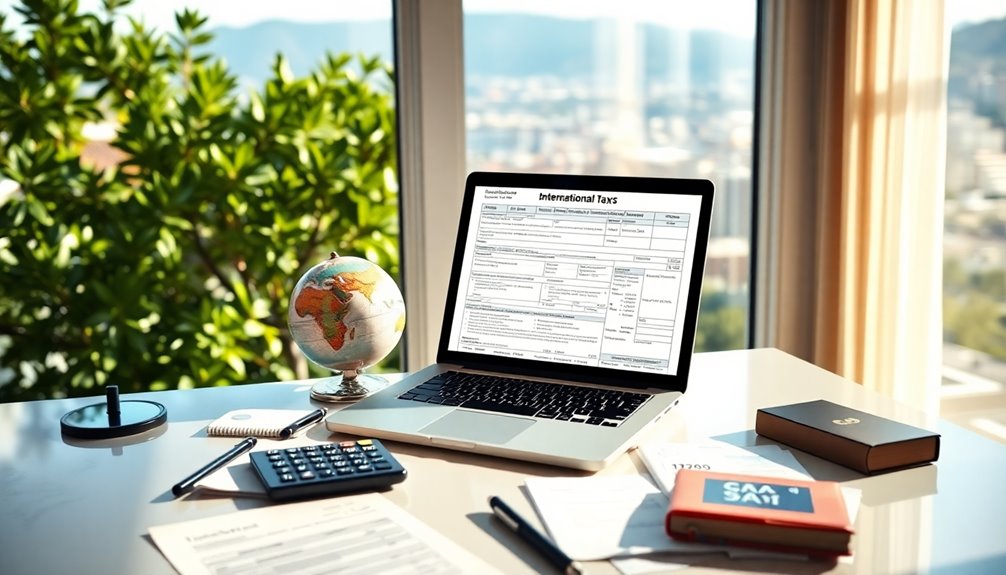When living overseas, you must report your worldwide income, file key forms like the 1040, and possibly disclose foreign bank accounts using FBAR or FATCA. Your residency status depends on specific country criteria, which affects your filing obligations and potential benefits from tax treaties. Staying organized and understanding the rules help you avoid penalties and maximize deductions. Continue exploring these essentials to guarantee your international tax compliance stays smooth and effective.
Key Takeaways
- Expatriates must report worldwide income using Form 1040 and may claim exclusions like Form 2555.
- Foreign bank accounts exceeding $10,000 require filing FBAR (FinCEN Form 114) and possibly Form 8938 under FATCA.
- Understanding residency rules and tax treaties helps prevent double taxation and ensures proper filing status.
- Maintaining organized records of foreign income, assets, and transactions simplifies compliance and reduces audit risks.
- Staying updated on deadlines, reporting requirements, and legal obligations ensures smooth international tax compliance.
Understanding Your Filing Requirements as an Expat

If you’re an expat living abroad, it’s important to understand your filing requirements with the IRS. As an expat, your responsibilities include reporting worldwide income and potentially filing additional forms like the FBAR and FATCA disclosures. Staying compliant prevents penalties and legal issues. To manage these obligations effectively, you should develop tax planning strategies that take advantage of exclusions, credits, and treaties available to you. Regularly reviewing your situation helps ensure you meet deadlines and avoid costly mistakes. Remember, your responsibilities aren’t just about filing; they involve understanding the specific forms and rules that apply to your circumstances. Additionally, knowing how to properly report foreign financial accounts, such as bicycle-related assets or expenses, can help you stay fully compliant and avoid penalties. Being aware of foreign asset reporting requirements is essential for comprehensive tax compliance. By staying informed and organized, you can navigate expatriate tax laws smoothly and optimize your tax outcomes.
Determining Your Tax Residency Status Abroad

Your tax residency status abroad depends on specific criteria that vary by country, so it’s crucial to understand how each jurisdiction defines it. Determining whether you’re a resident or non-resident can considerably impact your tax obligations. Clarifying your residency status early helps make certain you comply with local laws and avoid unexpected penalties. In some cases, Mother Baby Kids guidelines can offer helpful insights for expatriates navigating tax laws related to families abroad. Additionally, understanding sector performance metrics and how they influence local tax policies can be beneficial for expatriates involved in business ventures. Recognizing signs of spoilage in perishable items like lemon juice can also be an important aspect of managing household expenses and avoiding waste when living abroad. Being aware of tax treaties between countries can further assist in avoiding double taxation on income earned overseas.
Residency Criteria Variations
Determining your tax residency status abroad can be complex because different countries have varying criteria for establishing residency. Some countries base it on days spent in the country, while others consider ties like property, employment, or family. Tax treaties often help prevent double taxation and define residency rules for cross-border situations. Understanding these differences is vital to avoid misclassification and ensure proper filing. Additionally, being aware of the best vacuums available can help maintain a clean and healthy living environment while managing your international lifestyle. Recognizing tax treaty benefits can also significantly impact your tax obligations and compliance strategies, especially since creativity in problem-solving plays a role in navigating complex tax regulations. Moreover, staying informed about AI security developments can aid in protecting your personal data and financial information across digital platforms. Being aware of the IRA investment strategy specific to each state can further optimize your retirement planning while living abroad.
Tax Residency Determination
Understanding your tax residency status abroad requires carefully evaluating the specific rules and criteria set by each country. These rules determine whether you’ll be considered a resident for tax purposes and how your worldwide income is taxed. Many countries base residency on the number of days spent there, but others consider factors like permanent home or economic ties. This determination is vital to avoid dual taxation, where two countries claim taxing rights over the same income. Fortunately, tax treaties often help prevent this by establishing tie-breaker rules and reducing withholding taxes. Reviewing the treaty provisions between your home country and your host country can clarify your residency status, streamline your tax obligations, and minimize potential conflicts or double taxation. Additionally, some countries may use residency thresholds or other criteria to determine tax residency, making it essential to understand each jurisdiction’s specific rules. Understanding these factors can help you navigate international tax laws more effectively, especially when considering tax treaty benefits that can alleviate double taxation issues. Being aware of cybersecurity considerations, such as protecting your financial data online, is also increasingly important when managing your taxes remotely.
Key Tax Forms for International Filers

Guiding international tax filing requires familiarity with several key forms that guarantee compliance with both U.S. and foreign regulations. As an expat, understanding these forms can help you maximize tax treaty benefits and streamline expatriate tax planning. Key forms include:
Mastering key tax forms ensures compliance and maximizes benefits for expats abroad.
- Form 1040: Your main tax return for reporting worldwide income.
- Form 2555: Used to claim foreign earned income exclusion, reducing taxable income.
- FBAR (FinCEN Form 114): Reports foreign bank accounts exceeding $10,000.
- Form 8938: Discloses specified foreign financial assets.
- Recognizing how sound vibrations can influence cellular health and overall well-being can enhance your understanding of holistic approaches to health, which may be relevant when managing health-related tax deductions or benefits abroad.
- Staying updated on tax regulations is crucial for ensuring ongoing compliance and making informed financial decisions while living overseas. Being aware of filing deadlines helps avoid penalties and late submission issues, making your expatriate experience smoother. Additionally, understanding the impact of cookies on user experience can help you navigate online tax resources more efficiently, ensuring you access accurate and timely information. Being aware of alimony laws is also beneficial if your financial situation involves spousal support arrangements, as they can affect your tax filings.
These forms are essential for staying compliant and optimizing your tax situation abroad. Familiarity with them helps you avoid penalties and leverage tax treaties to your advantage. Proper filing supports a smoother expatriate experience and ensures you’re making the most of available benefits.
Reporting Worldwide Income

Once you’ve identified the key forms needed for compliance, it’s important to recognize that as an expat, you must report all income earned worldwide. This includes wages, investments, and cryptocurrency gains. Failing to do so can lead to penalties and compliance issues. To visualize, consider this table:
| Income Type | Reporting Requirement |
|---|---|
| Wages & Salaries | Include on Form 1040, worldwide |
| Cryptocurrency Gains | Report for cryptocurrency compliance |
| Investment Income | Declare dividends, interest |
| Estate Planning Income | Report for estate considerations |
You need to stay diligent in reporting income to avoid mishaps. Proper documentation supports your estate planning and guarantees compliance with international tax laws. Remember, transparency is key when dealing with overseas income.
Foreign Bank Accounts and Reporting Obligations

Are you aware of the reporting requirements for foreign bank accounts? If you hold foreign financial assets or bank accounts exceeding certain thresholds, you must file specific forms. Failing to report these can lead to hefty penalties. Here’s what you need to know:
- You must file the FBAR (Foreign Bank Account Report) if your combined foreign accounts surpass $10,000 at any time during the year.
- The IRS requires Form 8938 (FATCA report) if your foreign financial assets exceed specified thresholds based on your filing status.
- Both reports are separate from your regular tax return but are essential for compliance.
- Keeping accurate records of your foreign bank account balances and transactions simplifies the reporting process.
- Understanding the best-rated pinball machines of 2024 can be a fun way to take a break from complex tax obligations and enjoy some leisure time.
- Being aware of foreign bank account reporting obligations is crucial to avoid penalties and ensure you remain compliant with expat tax laws.
- Regularly monitoring your foreign financial assets helps ensure you stay within reporting thresholds and avoid inadvertent non-compliance.
- Additionally, understanding the thresholds for reporting can help you plan your financial disclosures more effectively.
- Staying informed about industry trends in expatriate taxation can help you adapt your reporting strategies and stay ahead of any regulatory changes.
Deductions and Credits Available to Expats

As an expat, you can take advantage of several tax deductions and credits to reduce your liability. The Foreign Earned Income Exclusion, housing deductions, and child or education credits are key benefits that could save you money. Understanding how to claim these can make a significant difference in your tax return. Additionally, familiarizing yourself with personality assessment tools can help you better understand your decision-making and stress management styles during tax season. Exploring essential oils for stress relief, such as lavender or bergamot, may also provide calming effects during this busy time, especially when considering environmental considerations like reducing stress on local ecosystems.
Foreign Earned Income Exclusion
Have you heard of the Foreign Earned Income Exclusion? It’s a valuable tool for expats to reduce taxable income. By qualifying, you can exclude up to a certain limit of your foreign earned income, easing your tax burden. To maximize its benefits, good tax planning and income segregation are essential. Here are key points to contemplate:
- You must meet the physical presence or bona fide residence tests
- Proper income segregation helps ensure only eligible earnings are excluded
- Keep detailed records of your time abroad and income sources
- The exclusion limit adjusts annually, so stay updated
Using this exclusion effectively requires understanding your eligibility and planning your income streams accordingly. It’s a strategic way to lower your tax liability while living overseas.
Housing Deduction Benefits
Building on your understanding of the Foreign Earned Income Exclusion, it’s also important to explore housing deductions and credits available to expats. You may qualify for rental savings through housing exclusions if you meet certain criteria, reducing the amount of income subject to tax. Additionally, property deductions can help you offset expenses related to your rental or owned housing abroad. These deductions might include rent, utilities, and other eligible costs, lowering your overall taxable income. Keep in mind that claiming these benefits requires careful documentation and adherence to IRS rules for foreign housing. By taking advantage of housing deductions, you can maximize your savings and reduce your tax liability while living overseas.
Child and Education Credits
Did you know that expats can still benefit from child and education tax credits even while living abroad? These credits can help reduce your tax burden by supporting your child’s well-being and education costs. For example, you may qualify for child tax credits if your child meets specific criteria, providing significant savings. Additionally, education savings programs allow you to plan for your child’s future, even internationally.
Consider these options:
- Claim child tax credits to offset dependent-related expenses
- Use education savings accounts for qualified educational costs
- Explore foreign tax treaties that may impact your eligibility
- Keep detailed records of qualifying expenses for credits and deductions
Being aware of these credits ensures you maximize your benefits and stay compliant with tax laws while overseas.
International Tax Treaties and Their Impact

International tax treaties play a crucial role in shaping how expats are taxed across different countries. These bilateral agreements help prevent double taxation and guarantee you don’t pay taxes twice on the same income. Treaty benefits often include reduced withholding tax rates, exemptions, or credits, making it easier to manage your tax obligations abroad. When you understand these treaties, you can leverage them to minimize your tax liability and avoid surprises during tax season. Each treaty is tailored to the specific countries involved, so it’s essential to review the details applicable to your situation. By familiarizing yourself with these agreements, you can navigate international tax rules more effectively and ensure you’re complying with all legal requirements.
Common Challenges and How to Overcome Them

Navigating expat taxes often involves overcoming several common challenges that can complicate your filing process. One major hurdle is understanding local tax laws, which vary widely and may be unfamiliar. Additionally, bank confidentiality concerns can make it tricky to access necessary financial information without breaching privacy rules. You might also face issues with foreign income reporting requirements or navigating complex treaty provisions. To manage these challenges:
Overcoming local tax laws and confidentiality issues eases expat tax challenges.
- Research local tax laws thoroughly before filing
- Consult with tax professionals experienced in expat issues
- Keep detailed records of all foreign income and assets
- Be aware of bank confidentiality restrictions that could affect disclosures
Addressing these issues head-on can help you stay compliant and avoid penalties, making your expat tax journey smoother.
Tips for Staying Compliant and Organized

Staying compliant and organized is essential to managing your expat taxes effectively. Keep detailed records of all income, expenses, and bank account transactions related to your expatriate status. Opening a dedicated bank account for your overseas finances simplifies tracking and guarantees you separate personal and business funds, making tax filing easier. Regularly update your records and review your financial documents, so you’re ready for any tax deadlines or audits. Understand your reporting requirements, like FBAR or FATCA, that apply to your bank accounts abroad. Staying proactive helps prevent penalties and keeps you in good standing with tax authorities. By maintaining organized records and understanding your expatriate status, you’ll reduce stress and ensure smooth compliance throughout your time overseas.
Frequently Asked Questions
How Does Expatriation Affect My U.S. Tax Obligations?
When you expatriate, you face significant expatriation consequences that impact your US tax obligations. You might be considered a covered expatriate, which could lead to capital gains tax on your worldwide assets. However, tax treaty benefits can help reduce or eliminate double taxation. You should carefully review these treaties and plan accordingly to manage your tax liabilities effectively after expatriation.
Can I Claim the Foreign Earned Income Exclusion if I Work Remotely?
Imagine working remotely from abroad and wondering if you can still claim the foreign earned income exclusion. You can, as long as you meet the IRS requirements like the physical presence or bona fide residence test. This tax exclusion helps you decrease your taxable income, making your overseas work more financially feasible. So yes, remote work doesn’t disqualify you from claiming the foreign earned income exclusion—just make sure you qualify!
What Penalties Exist for Late or Incomplete Foreign Tax Reporting?
If you miss reporting deadlines or submit incomplete foreign tax reports, you face tax penalties and interest charges. The IRS enforces strict reporting deadlines, and failure to comply can lead to significant fines or even criminal charges in severe cases. To avoid these penalties, guarantee you meet all filing requirements and deadlines. Staying proactive and accurate in your foreign tax reporting helps prevent costly penalties and keeps you in good standing with tax authorities.
Are There Specific Tax Implications for Dual Citizens Living Abroad?
As a dual citizen living abroad, you might face unique tax implications, especially if your countries have tax treaties. These treaties can help prevent double taxation and clarify reporting obligations. You’re generally required to report worldwide income to both countries, but tax treaties can offer relief. Stay aware of each nation’s rules to avoid penalties, and consider consulting a tax professional to navigate potential complexities effectively.
How Do I Handle State Tax Obligations When Living Overseas?
When living overseas, you need to determine your state residency status, as it affects your tax obligations. If you’re still considered a resident, you might owe state taxes. However, some states have tax treaties or rules that exempt you from state filing if you meet specific criteria. Make sure to update your residency status with your state, and consult local laws to understand your obligations and avoid double taxation.
Conclusion
Exploring expat taxes can feel like charting unfamiliar waters, but with the right knowledge, you’ll stay afloat. By understanding your filing requirements, maintaining organized records, and leveraging available deductions, you’ll make the process smoother—like a well-oiled machine. Remember, staying compliant isn’t just about avoiding penalties; it’s about protecting your financial future abroad. With preparation and awareness, you’ll navigate your expat tax journey confidently, like a seasoned traveler exploring new horizons.









